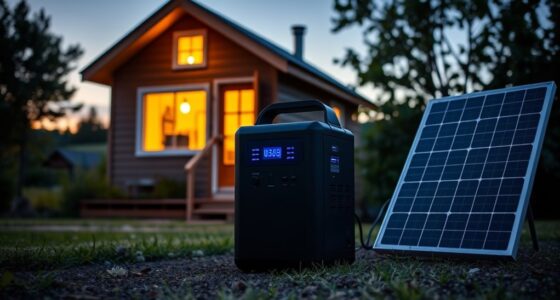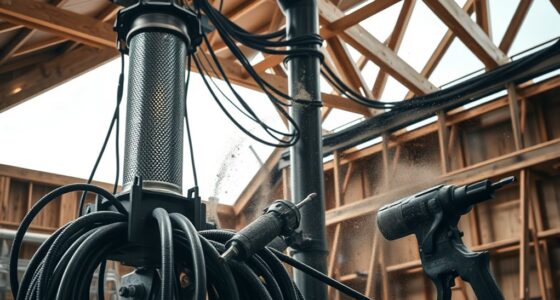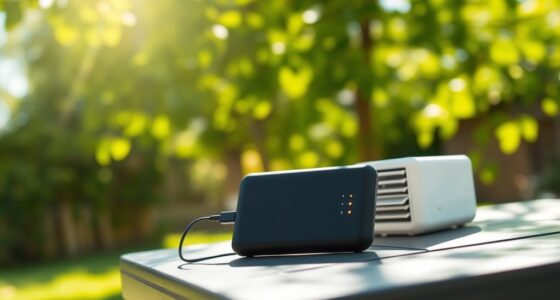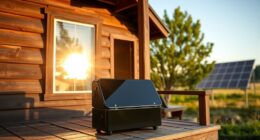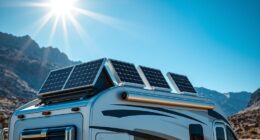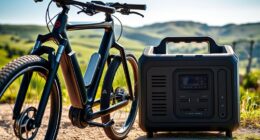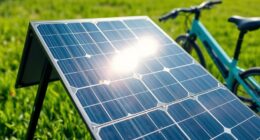To keep your heaters running during winter RVing, combine portable solar panels and efficient batteries to handle your electrical needs in sunlight, while relying on propane heaters for reliable warmth overnight. Make sure to position solar panels for maximum sun exposure and keep them clean. Remember to maintain proper ventilation and install carbon monoxide detectors for safety. Want to learn how to optimize your energy setup and stay warm even in cloudy weather? Keep exploring for practical tips.
Key Takeaways
- Use solar panels to generate daytime electricity and charge batteries for powering heaters during cloudy days.
- Combine solar power with portable propane heaters for reliable, continuous warmth overnight.
- Position solar panels south-facing and free of shade to maximize sunlight collection in winter.
- Regularly clean panels and monitor energy and fuel levels to prevent shortages and ensure heater operation.
- Ensure proper ventilation and install carbon monoxide detectors when operating propane heaters for safety.

Thinking about winter RVing? It’s an exciting adventure, but staying warm and comfortable can become a challenge when the temperatures drop. Fortunately, you have options to keep your heaters running smoothly, even in the coldest conditions. Portable power sources are essential, and understanding how to utilize solar panels and propane heaters can make all the difference. Solar panels are a great way to harness the sun’s energy during daylight hours, providing a renewable power source that reduces your reliance on traditional electrical hookups. With the right setup, solar panels can charge your RV’s batteries, ensuring you have power for your heater, lights, and other essentials. Keep in mind that winter sunlight can be limited, so it’s wise to invest in high-efficiency panels and a robust battery bank to store excess energy. Position your solar panels where they’ll receive maximum sunlight—ideally facing south and free of shade. Regularly cleaning the panels will ensure *superior* performance, especially after snowfalls or dust accumulation.
Alongside solar power, propane heaters are a popular choice for winter RVing because they provide reliable, immediate heat. Propane is portable and easy to refill, making it an ideal fuel source when off-grid or in areas with limited electrical service. Many RVs come equipped with propane heating systems, but you can also add portable propane heaters for additional warmth or backup. These heaters are efficient and produce a significant amount of heat quickly, which is *vital* during cold snaps. Always *verify* proper ventilation when operating propane heaters to prevent the buildup of carbon monoxide. Installing a carbon monoxide detector is a must for safety. When using propane heaters, keep a close eye on fuel levels and plan refills accordingly, especially when venturing into remote areas. Combining propane heaters with solar panels creates a balanced power system—solar panels handle your electrical needs during the day, while propane provides continuous heat overnight or during extended cloudy periods. Additionally, understanding sound vibrations and their influence on cellular health might inspire you to include sound-absorbing materials in your RV to improve sleep quality during cold, noisy nights.
In winter RVing, staying warm isn’t just about comfort; it’s about safety too. With portable power options like solar panels and propane heaters working together, you can enjoy your winter adventures with confidence. Proper planning *guarantees* your heat stays on, your batteries stay charged, and you’re prepared for the cold. Keep your systems well-maintained, monitor your energy and fuel levels, and always prioritize safety. By mastering these tools, you’ll turn winter RVing into an enjoyable, cozy experience—no matter how low the temperatures drop outside.
Frequently Asked Questions
How Long Can a Portable Heater Run on a Standard RV Battery?
Your question about how long a portable heater can run on a standard RV battery depends on battery capacity and power consumption. Typically, RV batteries have around 100 amp-hours, and a heater might use 1500 watts, which draws about 125 amps per hour. So, expect the heater to run roughly less than an hour on a fully charged 12V battery. To extend runtime, consider lower power settings or additional batteries.
What Safety Precautions Are Necessary When Using Portable Heaters in an RV?
When using portable heaters in your RV, you need to prioritize safety to prevent fire hazards and guarantee carbon monoxide safety. Always keep heaters away from flammable materials and never leave them unattended. Use heaters with tip-over and overheat protection. Make certain proper ventilation to avoid carbon monoxide buildup, and install a CO detector. Regularly check cords and connections for damage, and follow manufacturer instructions for safe operation.
Can Portable Power Sources Operate All Types of RV Heaters Effectively?
Did you know that over 60% of RVers face power issues during winter? Portable power sources can operate many RV heaters effectively, but success depends on fuel efficiency and power compatibility. You must select a power source that matches your heater’s wattage and fuel needs to stay warm. Always check the specifications to ensure your portable power can handle your heater’s demands, preventing outages and keeping you cozy.
How Do Weather Conditions Affect the Performance of Portable Power During Winter?
Weather conditions greatly impact your portable power’s performance. Lower temperatures can reduce battery efficiency, making it harder to power your heater effectively. Wind interference also plays a role, as strong gusts can cause power fluctuations or increase heat loss, requiring more energy to maintain comfort. To keep your heaters running smoothly, verify your power sources are well-maintained, and consider insulation to reduce the temperature impact and wind effect.
What Maintenance Is Required for Portable Power Systems in Cold Weather?
You need to regularly maintain your portable power systems to guarantee reliable performance. Start by insulating your batteries to prevent cold damage and maintain ideal power capacity. Check for corrosion and keep terminals clean, and confirm the system is stored in a dry, temperature-controlled environment when not in use. Additionally, periodically test your system’s power capacity to catch issues early, especially during winter when cold temperatures can reduce efficiency.
Conclusion
So, now you’ve mastered the art of keeping your RV warm with portable power—who knew winter camping could be so glamorous? Just think, while others shiver through icy nights, you’ll be cozy, powered, and probably feeling pretty smug about it. Just don’t forget to thank your trusty heater and those shiny batteries for turning your winter wonderland into a warm, portable paradise. Happy camping—and may your power never run out when you need it most!


